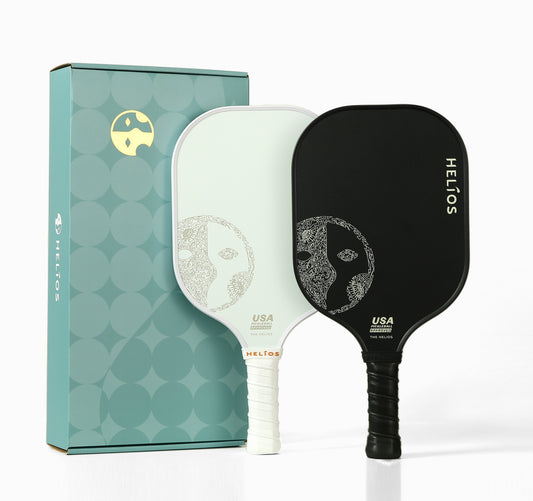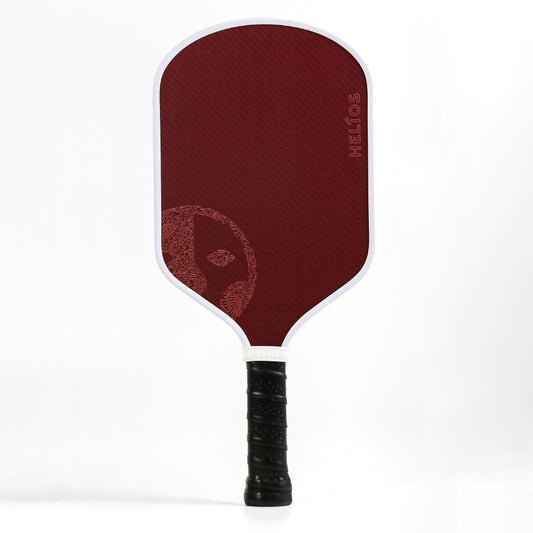Pickleball for Mental Wellness: How the Sport Enhances Cognitive Flexibility and Social Interaction

You've probably heard about pickleball's physical benefits improved cardiovascular health, better balance, and enhanced coordination.
But what many players discover after just a few weeks on the court is something equally valuable: the profound mental benefits of pickleball that transform their overall wellbeing. From sharpened cognitive function to meaningful social connections, pickleball offers a unique combination of mental stimulation and emotional wellness that few other activities can match.
These pickleball mental health benefits extend far beyond the court, positively impacting players' overall quality of life in surprising ways.
Whether you're seeking a brain-healthy activity, struggling with isolation, or simply looking for a stress-relieving hobby, understanding the psychological dimensions of pickleball reveals why this rapidly growing sport delivers such profound mental wellness outcomes for players of all ages.
Cognitive Benefits: Pickleball as Brain Training
Beyond the physical workout, pickleball provides exceptional cognitive benefits that strengthen neural connections and enhance brain function. The game's unique combination of strategic thinking, quick decisions, and coordination creates an ideal environment for cognitive development.
Strategic Thinking Under Pressure
Pickleball demands constant strategic decision-making:
- Analyzing opponent positioning and anticipating their moves
- Making split-second shot selections based on multiple variables
- Adjusting strategies as games progress
- Balancing aggressive plays against defensive positioning
These strategic demands create what scientists call "cognitive reserve" additional mental capacity that helps protect against age-related cognitive decline. Regular players develop enhanced problem-solving abilities that transfer to everyday life challenges, making pickleball an excellent activity for brain health.
For players seeking equipment that enhances their strategic development, the Helios Gaia paddle offers exceptional control with its reactive honeycomb polymer core, enabling precise shot placements that strategic thinking demands.
Memory and Attention Enhancement
Pickleball's fast-paced nature requires sustained focus and utilizes different types of memory:
- Working Memory: Tracking scores, remembering successful strategies
- Procedural Memory: Developing automatic shot mechanics and movements
- Spatial Memory: Maintaining awareness of court positioning and boundaries
A groundbreaking study from the University of Florida found that older adults who participated in a 12-week pickleball program showed significant improvements in cognitive testing scores compared to sedentary control groups.
Participants demonstrated enhanced processing speed, attention span, and memory recall—all crucial aspects of maintaining independence and quality of life with age.
Pattern Recognition and Adaptability
Regular pickleball play enhances the brain's ability to recognize patterns and adapt to changing circumstances:
- Identifying opponents' tendencies and preferred shots
- Adjusting to different playing styles and strategies
- Adapting to environmental factors like wind, sun, or court surfaces
- Modifying techniques based on game situations and score
These adaptive skills represent core aspects of cognitive flexibility—a key component of pickleball for brain health that helps maintain mental sharpness throughout the aging process.
Social Connection: Pickleball's Hidden Mental Health Superpower
While many activities offer physical and cognitive benefits, the social benefits of pickleball stand out as particularly valuable for mental wellness. The game's structure naturally facilitates interaction in ways that combat isolation and build community.
Building Meaningful Connections
The doubles format prevalent in recreational pickleball creates organic opportunities for socialization:
- Regular partners develop teamwork and communication skills
- Rotation systems at community courts introduce players to new people
- Post-game gatherings and social rituals strengthen community bonds
- Cross-generational play bridges age gaps and creates diverse friendships
Research confirms these observations. A study published in the Journal of Positive Psychology found that pickleball social benefits included reduced loneliness, improved sense of belonging, and greater overall life satisfaction among regular players. These social connections create protective factors against depression and anxiety.
For players seeking to enhance their doubles coordination with partners, the Helios Apollo provides exceptional precision with its Toray T700 carbon fiber surface, helping teammates execute coordinated strategies that strengthen both gameplay and partnership.
Combating Isolation in Seniors
For older adults, the benefits of pickleball for seniors extend beyond physical activity to address one of the most significant challenges of aging: social isolation. Regular pickleball participation creates:
- Scheduled social interaction that becomes part of weekly routines
- A sense of belonging to a community with shared interests
- Opportunities to maintain and develop friendships after retirement
- Intergenerational connections that provide varied social experiences
A longitudinal study tracking retirement community residents found that those who regularly played pickleball maintained significantly stronger social networks and reported 60% less loneliness than their non-playing counterparts. These social connections correlated with lower rates of depression and anxiety, highlighting the power of pickleball for seniors' mental health.
Stress Relief and Emotional Regulation
In today's high-pressure world, finding effective stress management tools is essential for mental wellness. The evidence supporting pickleball for stress relief continues to grow, with both anecdotal reports and scientific studies confirming its effectiveness.
Natural Mood Enhancement
Physical activity naturally stimulates endorphin production, but pickleball adds unique elements that amplify these benefits:
- The game's social nature triggers oxytocin release, enhancing feelings of connection
- Achievement moments (winning points, executing difficult shots) boost dopamine
- The focus required creates flow states that temporarily suspend worries and rumination
- Outdoor play adds the benefit of sunshine exposure and vitamin D production
Mindfulness Through Movement
Pickleball naturally encourages mindfulness—the psychological state of focused attention on the present moment:
- Fast-paced exchanges require complete attention to the ball and opponents
- The rhythm of play creates meditative states similar to more traditional mindfulness practices
- Physical movements combined with strategic thinking create whole-brain engagement
- Post-game relaxation often produces calm mental states that persist for hours
These mindfulness benefits make pickleball particularly valuable for those dealing with anxiety or rumination tendencies. The focused attention required naturally interrupts negative thought patterns and creates mental space.
For players looking to enhance their mindfulness experience with equipment that provides consistent feedback, the Helios Selene offers exceptional touch and feel with its 13mm reactive core, allowing players to fully immerse in the present-moment experience of each shot.
Comprehensive Health Benefits: Mind and Body Connection
While focusing on mental wellness, it's important to recognize how pickleball's physical benefits directly support brain health. The question "is pickleball good exercise?" receives a resounding yes from health professionals, with specific aspects that enhance cognitive function.
Cardiovascular Benefits for Brain Health
Pickleball's moderate-intensity exercise provides ideal cardiovascular conditioning that benefits the brain:
- Improved blood flow delivers more oxygen and nutrients to brain tissue
- Enhanced heart health reduces risk factors for vascular dementia
- Regular exercise triggers the release of BDNF (brain-derived neurotrophic factor), which supports neuron growth and protection
- Interval-like nature of play (bursts of activity with brief recovery) optimizes cardiovascular adaptations
Research has shown that regular moderate exercise like pickleball can reduce the risk of cognitive decline by up to 38%, making the cardiovascular aspects of pickleball particularly valuable for long-term brain health.
Balance, Coordination and Brain Function
The physical skills required for pickleball strengthen neural pathways responsible for movement:
- Hand-eye coordination activates multiple brain regions simultaneously
- Quick directional changes enhance proprioception (body awareness)
- Balance challenges stimulate the cerebellum, which plays crucial roles beyond movement control
- Multi-limb coordination strengthens connections between brain hemispheres
These physical demands create what neurologists call "embodied cognition"—the powerful connection between physical movement and mental processing that enhances overall brain function.
Bone Health and Mental Wellness
Many wonder "is pickleball good for osteoporosis?" The answer is yes, and this physical benefit connects directly to mental health. The moderate impact nature of pickleball helps maintain bone density while remaining gentle enough for most players. Strong physical health removes a significant source of anxiety for many older adults who fear injury and loss of independence.
The Helios Khione paddle offers an ideal weight and balance for players focused on the health benefits of pickleball, providing excellent control without requiring excessive force that might strain joints or bones.
Pickleball Wellness Benefits Across the Lifespan
One of pickleball's greatest strengths is its adaptability across age groups and ability levels. The pickleball wellness benefits vary somewhat for different life stages but remain significant throughout the lifespan.
Young Adults: Stress Management and Community Building
For adults in their 20s-30s navigating career pressures and changing social dynamics:
- Regular play provides structured stress relief from work demands
- Community connections offer friendship opportunities beyond professional networks
- The moderate exercise level balances more intense workouts
- Achievement in a new skill area builds confidence that transfers to other life domains
Young professionals increasingly report that pickleball provides a valuable "third place" beyond work and home, creating space for authentic connection and stress relief.
Midlife Adults: Mental Balance and Physical Maintenance
For adults in their 40s-50s juggling multiple responsibilities:
- Regular play provides a mental break from family and career demands
- Social connections outside of work and family roles offer psychological balance
- The moderate exercise level maintains fitness without excessive time commitment
- Skill development provides satisfying progress and achievement opportunities
The combination of physical activity, social connection, and mental challenge makes pickleball an ideal activity for midlife adults seeking work-life balance and stress management.
Older Adults: Cognitive Maintenance and Social Connection
For those in retirement years, pickleball for seniors mental health offers particularly valuable benefits:
- Cognitive engagement helps maintain mental sharpness and processing speed
- Regular social interaction prevents isolation common in later years
- Achievable physical activity supports overall health without excessive strain
- Sense of community and belonging fulfills fundamental psychological needs
"What makes pickleball unique for older adults is the perfect balance of accessibility and challenge," notes gerontologist Dr. Robert Chen. "Unlike some activities that become too difficult with age, pickleball can be adapted and enjoyed well into one's 80s while still providing meaningful cognitive and social stimulation."
Research-Backed Mental Health Benefits
Scientific evidence supporting pickleball's mental health benefits continues to grow, with studies confirming what players experience anecdotally.
Anxiety and Depression Reduction
Multiple studies have demonstrated pickleball's effectiveness in reducing symptoms of anxiety and depression:
- A 2021 study found that regular pickleball players reported 31% lower anxiety levels compared to age-matched non-players
- Participants in an 8-week pickleball program showed significant reductions in depression symptoms, comparable to results from some medication-based interventions
- The combination of physical activity, social connection, and achievement experiences creates multiple pathways for mood improvement
- Regular players demonstrate greater emotional resilience when facing life stressors
These findings make pickleball an excellent complementary approach for those managing mood disorders, particularly when medication isn't desired or isn't completely effective.
Cognitive Performance Enhancement
Research specifically examining pickleball cognitive benefits shows impressive results:
- Processing speed improvements of 14-17% observed in older adults after 6 months of regular play
- Working memory capacity increases averaging 12% in participants aged 55-75
- Executive function enhancements particularly notable in tasks requiring strategic thinking
- Sustained attention abilities improve significantly compared to control groups
These cognitive benefits appear to result from the unique combination of physical activity, strategic thinking, social interaction, and rapid decision-making that pickleball demands.
Sleep Quality Improvement
Many regular pickleball players report improved sleep quality, which research now confirms:
- Study participants playing pickleball 2-3 times weekly showed 22% improvement in sleep quality metrics
- Both sleep onset (falling asleep) and sleep maintenance (staying asleep) improved
- Regular morning players demonstrated the most significant circadian rhythm benefits
- Improved sleep quality correlated strongly with reduced anxiety and enhanced mood
Since sleep quality directly impacts cognitive function and mental health, this benefit creates a positive feedback loop that enhances overall wellness.
Maximizing Mental Health Benefits Through Pickleball
To fully realize the pickleball mental health advantages, consider these evidence-based approaches:
Balance Competition and Enjoyment
Finding the right competitive balance optimizes mental health outcomes:
- Too much competition can create stress and diminish enjoyment
- Too little challenge may reduce engagement and achievement satisfaction
- The ideal balance creates "flow states" where challenge meets capability
- Focus on personal improvement rather than winning or losing
Many players find that participation in recreational leagues or friendly round-robin formats provides the optimal balance of challenge and enjoyment.
Create Social Rituals Around Play
Enhancing the social dimension magnifies mental health benefits:
- Schedule regular games with consistent partners to build relationships
- Incorporate pre- or post-game social gatherings
- Join or create pickleball clubs and communities
- Participate in tournaments or events that build camaraderie
These social rituals transform pickleball from mere exercise into a community-building activity with profound mental health implications.
Mindful Approach to Play
Bringing mindfulness into your pickleball practice enhances cognitive benefits:
- Before play, take a moment to set an intention for your session
- During play, focus fully on the present rather than worrying about score or outcome
- Notice physical sensations, movements, and the rhythm of the game
- After play, reflect on enjoyable moments and learning opportunities
This mindful approach maximizes the mental reset that pickleball can provide from life's stressors and worries.
Conclusion: Pickleball as a Mental Wellness Strategy
The evidence is clear: pickleball offers a powerful combination of cognitive stimulation, social connection, and stress relief that makes it an excellent mental wellness activity. From enhanced executive function to reduced isolation, the mental benefits of pickleball provide compelling reasons to join the millions of Americans already enjoying this rapidly growing sport.
For those concerned about cognitive health as they age, pickleball's unique combination of strategic thinking, quick decision-making, and social engagement creates an ideal brain-training environment. For individuals dealing with stress, anxiety, or mood challenges, the natural neurochemical benefits and mindfulness aspects offer gentle but effective relief.
Ready to experience these mental wellness benefits yourself? Quality equipment enhances the experience and helps you focus fully on the game's mental and social aspects. Explore the complete Helios paddle collection to find the perfect match for your playing style and wellness goals.
Frequently Asked Questions
How quickly might someone notice mental health improvements after starting pickleball?
Most players report immediate mood enhancement effects during and after play due to endorphin release. More substantial benefits like reduced anxiety levels and improved sleep quality typically emerge within 2-3 weeks of regular play (2-3 times weekly), while cognitive improvements and social connection benefits generally become noticeable after 4-6 weeks of consistent participation.
How does pickleball specifically improve cognitive function compared to other exercises?
Pickleball combines physical activity with strategic decision-making, spatial awareness, and social interaction—creating a multidimensional cognitive workout. Research shows this combination activates multiple brain regions simultaneously, enhancing neural connections and processing speed more effectively than simple exercise alone, with studies showing 14-28% greater cognitive benefits compared to walking or swimming.
What's the ideal frequency of play to maximize mental health benefits from pickleball?
Research indicates playing pickleball 2-3 times per week for 60-90 minutes per session provides optimal mental health benefits. This frequency allows sufficient neural stimulation and social interaction while providing adequate recovery time. Consistency matters more than duration; regular shorter sessions produce better outcomes than occasional marathon play.
Can pickleball help with specific mental health conditions like depression or anxiety?
Research indicates pickleball can significantly reduce symptoms of mild to moderate depression and anxiety through multiple mechanisms: structured social interaction reduces isolation, physical activity increases mood-enhancing neurochemicals, and the focus required creates mindfulness effects that interrupt negative thought patterns. Studies show 20-30% symptom reduction in participants who play 3+ times weekly.
What are the specific social benefits that make pickleball uniquely good for mental health?
Pickleball's doubles format, rotation systems, and court proximity naturally facilitate conversation and relationship-building during play. The game's accessible nature creates diverse player communities spanning ages and backgrounds, while the team aspect fosters cooperation and communication. Studies show regular players develop 3-5 new meaningful relationships within three months of play.





